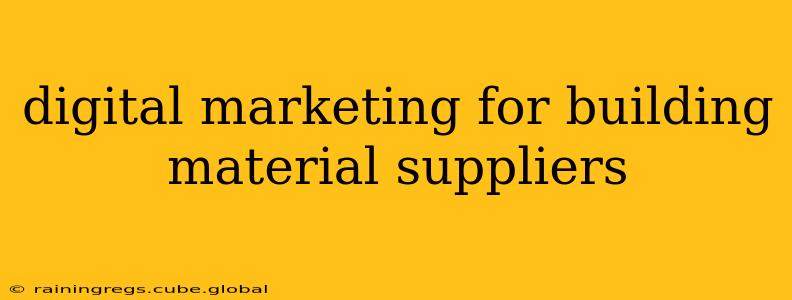The building materials industry is ripe for disruption, and savvy suppliers are leveraging digital marketing to gain a competitive edge. Gone are the days of relying solely on word-of-mouth and industry events. Today, a robust online presence is crucial for attracting new customers, nurturing existing relationships, and driving sales. This comprehensive guide explores effective digital marketing strategies specifically tailored for building material suppliers.
Understanding Your Target Audience
Before diving into specific tactics, it's essential to understand your ideal customer. Are you targeting residential builders, commercial contractors, architects, or DIY homeowners? Each segment has different needs, preferences, and online behavior. Detailed buyer personas will inform your messaging, channel selection, and content creation. Consider factors like:
- Project size: Small residential projects versus large-scale commercial developments.
- Budget: High-end materials versus budget-friendly options.
- Location: Geographic targeting is key for local businesses.
- Preferred communication channels: Email, social media, or industry forums.
Key Digital Marketing Channels for Building Material Suppliers
Several channels offer significant opportunities for building material suppliers:
1. Search Engine Optimization (SEO):
SEO is paramount for attracting organic (unpaid) traffic. Optimizing your website for relevant keywords, such as "concrete supplier near me," "lumber distributor," or "roofing materials wholesale," will ensure your business appears in search engine results when potential customers search online. This includes:
- Keyword research: Identify the terms your target audience uses to find building materials.
- On-page optimization: Optimize website content, meta descriptions, and image alt text.
- Off-page optimization: Build high-quality backlinks from reputable sources.
- Local SEO: Optimize your Google My Business profile to appear in local search results.
2. Pay-Per-Click (PPC) Advertising:
PPC advertising, particularly Google Ads, allows you to target specific keywords and demographics. You pay only when someone clicks on your ad, making it a cost-effective way to reach potential customers quickly. Consider using location targeting to reach customers in your service area.
3. Social Media Marketing:
Platforms like LinkedIn, Instagram, and even Facebook can be highly effective. Share high-quality images and videos showcasing your products, highlight successful projects, and engage with industry professionals. LinkedIn is particularly beneficial for connecting with architects and contractors. Instagram allows for visually appealing content showcasing the aesthetic aspects of your materials.
4. Email Marketing:
Build an email list by offering valuable content, such as project guides or material specifications. Regular email newsletters keep your customers informed about new products, promotions, and industry trends.
5. Content Marketing:
Creating valuable content, such as blog posts, case studies, and white papers, establishes your expertise and attracts potential customers. Focus on topics relevant to your target audience, such as:
- Material selection guides: Help customers choose the right materials for their projects.
- Project case studies: Showcase successful projects using your materials.
- Industry news and trends: Keep customers informed about the latest developments.
H2: What are the most effective ways to market building materials online?
The most effective online marketing strategies for building material suppliers combine a multi-channel approach, focusing on SEO, PPC, and engaging content that showcases expertise and builds trust. Prioritizing local SEO is crucial for attracting customers in your geographic area. High-quality visuals and videos demonstrating the applications and benefits of your materials are equally important.
H2: How can I use social media to promote my building materials business?
Social media platforms offer excellent opportunities for showcasing your products visually and engaging with your target audience. LinkedIn is ideal for connecting with industry professionals, while Instagram allows you to highlight the aesthetic qualities of your materials through high-quality images and videos. Remember to engage with comments and participate in relevant industry conversations.
H2: What are some examples of successful digital marketing campaigns for building material suppliers?
Successful campaigns often focus on providing value to the customer. This could be through educational content (e.g., guides on material selection), visually stunning project showcases, or targeted advertising campaigns focusing on specific demographics or project types. Analyzing successful campaigns often reveals a blend of SEO, PPC, and well-crafted content.
H2: How can I improve my website's SEO for building materials?
Improving your website's SEO involves keyword research to identify relevant search terms, on-page optimization (optimizing title tags, meta descriptions, and content), and off-page optimization (building high-quality backlinks). Focus on long-tail keywords specific to your products and location. Ensure your website is mobile-friendly and loads quickly.
Conclusion:
Digital marketing is no longer optional for building material suppliers; it's a necessity. By implementing a strategic approach that encompasses SEO, PPC, social media, email marketing, and compelling content, building material suppliers can effectively reach their target audience, build brand awareness, and drive sales. Remember that consistency and adaptation are key to long-term success. Continuously monitor your campaigns, analyze the data, and adjust your strategy as needed.
